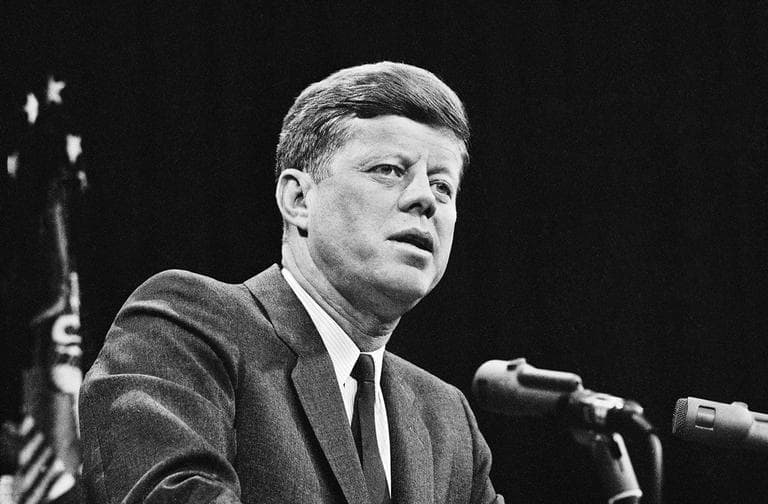Advertisement
Last Secret Recordings Of JFK Reveal Income Inequality As Issue In Re-Election Bid
Resume
Wealth, prosperity and income inequality are powerful issues in this year's presidential election.
Plus ça change.
Almost 50 years ago, wealth, prosperity and income inequality were also major issues in the re-election campaign of John F. Kennedy.
On Tuesday, the John F. Kennedy Presidential Library released 45 hours of privately recorded meetings and phone calls made in the final month's of Kennedy's life. In the tapes, you hear Kennedy asking his political advisers, "What is it that's going to make them vote for us? What is it we have to sell them? We hope we have to sell them prosperity, but for the average guy, the prosperity is nil — and the people who really are well-off, hate our guts."
"He started making the tapes after the Bay of Pigs," said Tom Putnam, director of the JFK Library. Kennedy had been unhappy with how the military had been portraying the failed CIA-led attempt to invade southern Cuba. "He wanted to capture what was really happening in the White House."
The 1963 recordings capture meetings from the final three months of Kennedy's administration. Unemployment was at 5.6 percent, but Kennedy wasn't convinced that average voters recognized how they were feeling the benefits of the strengthening economy.
"He saw the economy moving," Putnam said, "But he still saw pockets of entrenched poverty." The so-called War on Poverty, conceived under Kennedy, was eventually put into place by President Lyndon B. Johnson.
The recordings also highlight how much has changed since 1962. Kennedy faced an intransigent Congress, but most of the resistance came from members of his own party, particularly the Southern Democratic Leadership.
Kennedy also spoke pointedly about battles he faced with big business. While a member of the "1 percent" of his time, Kennedy took on steel industry executives in 1962. "Having helped to negotiate a non-inflationary wage settlement with the United Steelworkers Union, Kennedy thought he had an agreement with industry executives that, in exchange, they would not raise the price of steel that year," Putnam said.
But they did.
Kennedy shot back in a speech later that year. He recalled the famous "ask not what your country can do for you, ask what you can do for your country" line from his inaugural address. "And Kennedy said, 'Now we know what the steel industry would do,' " Putnam said.
Putnam adds that while the steel industry later rescinded the price increase, it left Kennedy frustrated. "He gave a speech describing the relationship between government and big business," Putnam said, "It was 'clogged by illusions and platitudes.' "
In 1983, JFK Library and Museum officials started reviewing tapes without classified materials and releasing recordings to the public. Officials were able to go through all the recordings by 1993, working with government agencies when it came to national security issues and what they could make public.
In all, the JFK Library and Museum has put out about 40 recordings. Officials excised about 5 to 10 minutes of this last group of recordings due to family discussions and about 30 minutes because of national security concerns.
The library released the recordings on the same day President Obama is scheduled to deliver the 2012 State of the Union address. The speech is considered by many to effectively kick-off his re-election campaign.
"Kennedy asked the question how, as a country, we can create wealth, but be sure that the wealth is distributed equally," Putnam said. "How President Obama and his Republican rival present their plans," — their answer to that question — "will determine the election."
Kennedy never lived to complete his re-election bid. The final recording in the collection was made just two days before his assassination in Dallas on Nov. 22, 1963. Putnam said the best glimpse of how Kennedy may have envisioned a second term came in a speech he gave in Houston the night before he died:
An America of the future, with 300 million people living in this country, with a $2 trillion economy, will happen in this century... An America strong in science and in space, in health and in learning, in the respect of its neighbors and all nations, an America that is both powerful and peaceful, with a people that are both prosperous and just. With that vision, we shall not perish, and we cannot fail.
Additional reporting for this story provided by the Associated Press
Guests:
- Tom Putnam, director of the John F. Kennedy Library
More:
This program aired on January 24, 2012.
